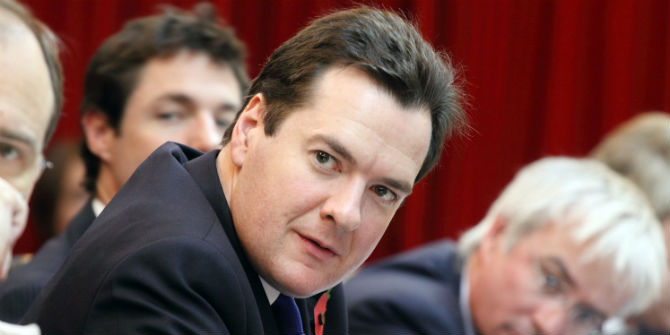 Geraint Johnes writes that the effect of the weather on the economy is to divert spending from one thing to another rather than to simply generate more spending. So, while the 2018 heatwave will have an effect on the economy, this will be quite subtle.
Geraint Johnes writes that the effect of the weather on the economy is to divert spending from one thing to another rather than to simply generate more spending. So, while the 2018 heatwave will have an effect on the economy, this will be quite subtle.
It’s been hot, hasn’t it? Many people have been comparing the UK’s summer heatwave of 2018 with the legendary summer of 1976, when the Wurzels topped the charts with their classic song, Combine Harvester.
Harvests are of course affected by the weather. The prolonged lack of rainfall over recent months is threatening to have a serious negative impact on crop yields, with forecasts suggesting a fall of between 10% and 15% in the production of wheat and other cereals. The reduction in supply is likely to push up prices, especially given the geographically widespread nature of the heatwave – agricultural production is down across the whole of Europe. Between mid-June and late July, the price of futures in London wheat has shot up by over 20%. This price rise will more than compensate wheat producers for the fall in output, but it will raise the costs of production for users of wheat products – which include others in the farming sector, food manufacturers, and final consumers. Expect the price of bread and other produce to rise.
But the weather has an impact on the supply side of the economy that goes way beyond agriculture. Results from a number of studies suggest that labour productivity falls by around 2% for every 1°C increase in temperature above 25°C – though the relationship is quite a complicated one and there is some disagreement amongst researchers about the true nature of the effect.
As well as affecting supply, the weather has an effect on the demand for a whole variety of products. We know, for example, that a 1% increase in temperature (measured in degrees Celsius) leads to an increase in the demand for ice cream of around 1.2%, and an increase in the demand for cold alcoholic drinks of about 2.4%. People may spend more on meat for the barbecue during spells of hot weather, but at the same time they spend less on roasting joints that are likely to heat up the house.
This prompts an important observation. The hot weather cuts two ways. It raises demand for things that keep us cool, but it reduces demand for things that (at other times of the year) we may consume to help keep us warm. So, just as ice cream sales rise during the heatwave, sales of sticky toffee pudding fall. One dessert is enough, regardless of the weather.
For a different reason, the same is true of consumer durables. A prolonged spell of hot weather may raise demand for portable air conditioning units. But if a family buys an air conditioner (or a sunbed, or a barbecue, or a beach ball), it has less left to spend on other things. The effect of the weather is to divert spending from one thing to another – not simply to generate more spending.
It really matters, though, where these different things are produced – if we were all to sacrifice a family meal in a local restaurant in order to buy an imported portable air conditioning unit, that will have an effect on the country’s balance of payments. Likewise, if people choose to stay in the UK for their holidays rather than go abroad to chase the sun, that too will have an effect on the country’s economy. A 1% increase in July temperatures typically leads to an increase of around 0.4% in leisure trips taken domestically. This may seem to be quite a small figure, but of course many people have booked their holidays long before they know that a heatwave is on the cards.
Taking all these things together, the weather certainly has an effect on the economy. But there are swings and roundabouts, winners and losers, so the overall impact is quite subtle. A few months ago, a period of lost output was being blamed on snow. Between snow, heat and leaves on the line, the climatic sweet spot for Brits seems vanishingly small!
__________
 Geraint Johnes is Professor of Economics at Lancaster University.
Geraint Johnes is Professor of Economics at Lancaster University.
All articles posted on this blog give the views of the author(s), and not the position of LSE British Politics and Policy, nor of the London School of Economics and Political Science. Featured image credit: Pixabay (Public Domain).








1 Comments